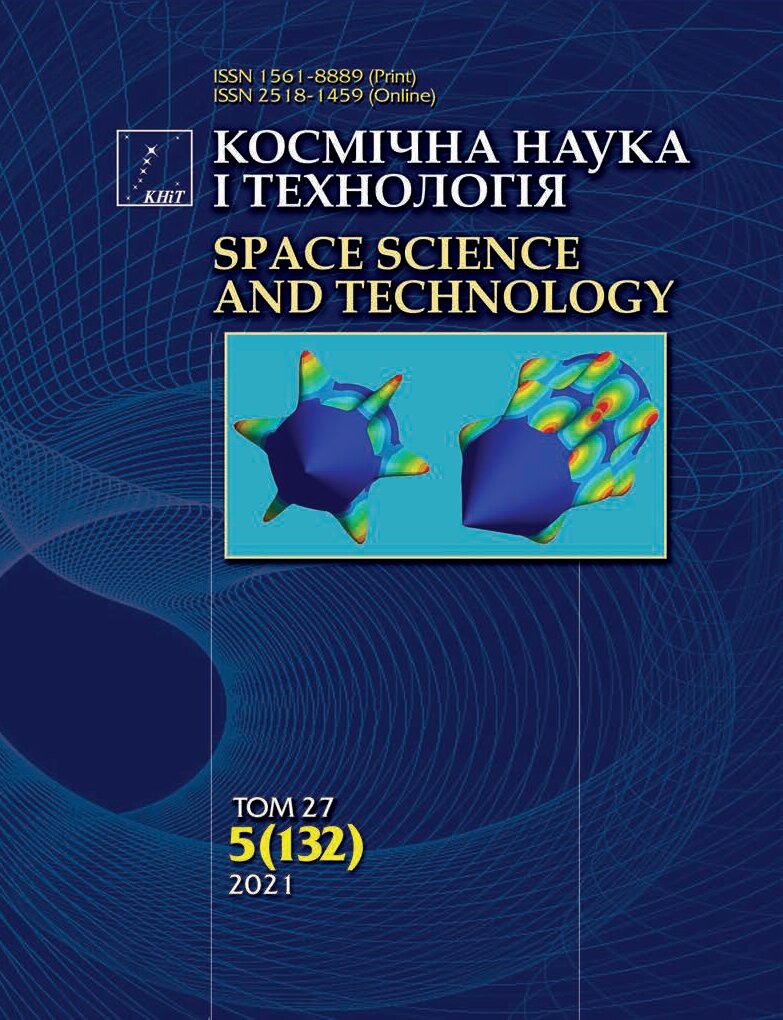Динамічна втрата стійкості складеною нанокомпозитною оболонкою
DOI:
https://doi.org/10.15407/knit2021.05.060Ключові слова:
вільні коливання, вуглецеві нанотрубки, динамічна втрата стійкості, нанокомпозит, складена оболонка, функціонально-градієнтний матеріалАнотація
Досліджено вільні коливання та динамічну втрату стійкості функціонально-градієнтної композитної складеної коніко-циліндричної оболонки з матеріалу, посиленого вуглецевими нанотрубками, в надзвуковому газовому потоці. Розглянуто нанокомпозитні матеріали з лінійним розподілом об’ємної частки нанотрубок за товщиною. Розширене правило змішування застосовано для оцінки механічних характеристики нанокомпозиту. Для моделювання деформування оболонки використано теорію деформацій зсуву високого порядку. Для отримання рівнянь руху конструкції застосовано метод заданих форм та метод Релея-Рітца. Для аналізу динаміки складеної оболонки запропоновано використання базисних функцій, які автоматично задовольняють умовам безперервності переміщень на стику циліндричної та конічної оболонок. Для моделювання впливу надзвукового газового потоку на оболонку використано поршневу теорію. Розглянуто приклад аналізу динаміки нанокомпозитної коніко-циліндричної оболонки під дією надзвукового потоку. Результати аналізу її власних коливань методом Релея-Рітца демонструють високу збіжність з власними частотами оболонки, отриманими методом скінченних елементів. При цьому метод скінченних елементів може бути застосовано лише до оболонок з матеріалу з постійним розподілом нанотрубок за товщиною. Досліджено залежність власних частот коливань складеної оболонки від співвідношення довжини конічної та циліндричної частин. Досліджено залежність критичного тиску надзвукового потоку від чисел Маха та виду армування вуглецевими нанотрубками. Оболонки з концентрацією нанотрубок переважно поблизу до зовнішній та внутрішній поверхонь характеризуються більшими значеннями власних частот та критичного тиску, ніж оболонки з рівномірним розподілом нанотрубок або такі, в яких максимальна концентрація нанотрубок досягається всередині оболонки.Посилання
Amabili M. (2015). Non-linearities in rotation and thickness deformation in a new third-order thickness deformation theory for static and dynamic analysis of isotropic and laminated doubly curved shells. Int. J. Non-Linear Mechanics, 69, 109-128.
https://doi.org/10.1016/j.ijnonlinmec.2014.11.026
Asadi H. (2018). Numerical simulation of the fluid-solid interaction for CNT reinforced functionally graded cylindrical shells in thermal environments. Acta Astronaut., 138, 214-224.
https://doi.org/10.1016/j.actaastro.2017.05.039
Avramov K. V., Chernobryvko M. V., Kazachenko O., Batutina T. J. (2016). Dynamic instability of parabolic shells in supersonic gas stream. Meccanica, 51, 939-950.
https://doi.org/10.1007/s11012-015-0247-4
Avramov K V., Chernobryvko M., Uspensky B., Seitkazenova K. K., Myrzaliyev D. (2019). Self-sustained vibrations of functionally graded carbon nanotubes-reinforced composite cylindrical shells in supersonic flow. Nonlinear Dynamics, 98(3), 1853-1876.
https://doi.org/10.1007/s11071-019-05292-z
Caresta M., Kessissoglou N. (2010). Free vibrational characteristics of isotropic coupled cylindrical-conical shells. J. Sound and Vib., 329 (6), 733-751.
https://doi.org/10.1016/j.jsv.2009.10.003
Chernobryvko M. V., Avramov K. V., Romanenko V. N., Batutina T. J., Tonkonogenko A. M. (2014). Free linear vibrations of parabolic shells. Meccanica, 49 (8), 14-21.
https://doi.org/10.1007/s11012-014-0027-6
ChwaЕ‚ M., Muc A. (2019). Buckling and free vibrations of nanoplates-comparison of nonlocal strain and stress approaches. Appl. Sci., 9, 1409.
https://doi.org/10.3390/app9071409
Hoff N. J. (1951). The dynamics of the buckling of elastic columns. Proc. of the Soc. for Exper. Stress analysis, 9 (1), 68-74.
https://doi.org/10.1115/1.4010222
Hu W. C. L., Raney J. P. (1965). Experimental and analytical study of vibrations of joined shells. AIAA J.,5(5), 976-980.
https://doi.org/10.2514/3.4111
Irie T., Yamada G., Myramoto Y. (1984). Free vibration of joined conical-cylindrical shells. J. Sound and Vib., 95(1), 31-39.
https://doi.org/10.1016/0022-460X(84)90256-6
GarcГa-MacГas E., RodrГguez-Tembleque L., SГЎez A. (2018). Bending and free vibration analysis of functionally graded graphene vs. carbon nanotube reinforced composite plates. Composite Struct., 186, 123-138.
https://doi.org/10.1016/j.compstruct.2017.11.076
Krumhaar Hans (1963). The accuracy of linear piston theory when applied to cylindrical shells. AIAA J., 1 (6), 1448-1449.
https://doi.org/10.2514/3.1832
Lashkari M., Weingarten V. I. (1973). Vibrations of segmented shells. Exp. Mech., 13(3), 120-125.
https://doi.org/10.1007/BF02323969
Lei Z. X., Zhang L. W., Liew K. W. (2016). Buckling analysis of CNT reinforced functionally graded laminated composite plates. Composite Struct., 152, 62-73.
https://doi.org/10.1016/j.compstruct.2016.05.047
Liu Y. J., Chen X. L. (2003). Evaluations of the effective material properties of carbon nanotube-based composites using a nanoscale representative volume element. Mechanics of Materials, 35, 69-81.
https://doi.org/10.1016/S0167-6636(02)00200-4
Mehar K., Panda S. K., Mahapatra T. R. (2017). Theoretical and experimental investigation of vibration characteristic of carbon nanotube reinforced polymer composite structure. Int. J. mech. Sci., 133, 319-329.
https://doi.org/10.1016/j.ijmecsci.2017.08.057
Mehri M., Asadi H., Kouchakzadeh M. A. (2017). Computationally efficient model for flow-induced instability of CNT reinforced functionally graded truncated conical curved panels subjected to axial compression. Comput. Methods Appl. Mech. Energ, 318, 957-980.
https://doi.org/10.1016/j.cma.2017.02.020
Mehri M., Asadi H.; Wang Q. (2016). On dynamic instability of a pressurized functionally graded carbon nanotube reinforced truncated conical shell subjected to yawed supersonic airflow. Composite Struct., 153, 938-951.
https://doi.org/10.1016/j.compstruct.2016.07.009
Meirovitch L. (1998). Elements of vibration analysis. New York: McGraw-Hill Publishing Company, 560 p.
Moradi-Dastjerdi R., Foroutan M., Pourasghar A. (2013). Dynamic analysis of functionally graded nanocomposite cylinders reinforced by carbon nanotube by a mesh-free method. Materials and Design, 44, 256-266.
https://doi.org/10.1016/j.matdes.2012.07.069
Odegard G. M., Gates T. S., Wise K. E., Park C., Siochi E. J. (2003). Constitutive modeling of nanotube-reinforced polymer composites. Composites Science and Technology, 63, 1671-1687.
https://doi.org/10.1016/S0266-3538(03)00063-0
Reddy J. N. (1984). A simple higher-order theory for laminated composite plates. ASME J. Applied Mechanics,51, 745-752.
https://doi.org/10.1115/1.3167719
Reddy J. N. (1984). A refined nonlinear theory of plates with transverse shear deformation. Int. J. Solids and Structures, 20(9/10), 881-896.
https://doi.org/10.1016/0020-7683(84)90056-8
Ritz W. (1909). Uber eine Methode zur Losung gewisser Vatiations probleme der mathematiscen Physik. J. fur die reine und angewandte Mathematik. Bd 135, Heft 1, 61 S.
https://doi.org/10.1515/crll.1909.135.1
Seidel G. D., Lagoudas D. C. (2006). Micromechanical analysis of the effective elastic properties of carbon nanotube reinforced composites. Mechanics of Materials, 38, 884-907.
https://doi.org/10.1016/j.mechmat.2005.06.029
Sivadas K. R., Ganesan N. (1990). Free vibration of cantilever conical shells with variable thickness. Comput. Struct.,36(3), 559-566.
https://doi.org/10.1016/0045-7949(90)90290-I
Strutt J. W. (Rayleigh) The theory of sound. 2nd edition. London and New York, McMillan and Co, (1894) V. 1, 480 p.; (1896) V. 2, 504 p.
Wang A., Chen H., Hao Y., Zhang W. (2018). Vibration and bending behavior of functionally graded nanocomposite doubly-curved shallow shells reinforced by graphene nanoplatelets. Results in Phys., 9, 550-559.
https://doi.org/10.1016/j.rinp.2018.02.062
Zhang L. W., Lei Z. X., Liew K. M., Yu J. L. (2014). Static and dynamic of carbon nanotube reinforced functionally graded cylindrical panels. Composite Struct., 111, 205-212.
https://doi.org/10.1016/j.compstruct.2013.12.035
Zhang L. W., Song Z. G., Liew K. M. (2017). Modeling aerothermoelastic properties and active flutter control of nanocomposite cylindrical shells in supersonic airflow under thermal environments. Comput. Methods Appl. Mech. Eng., 325, 416-433.


